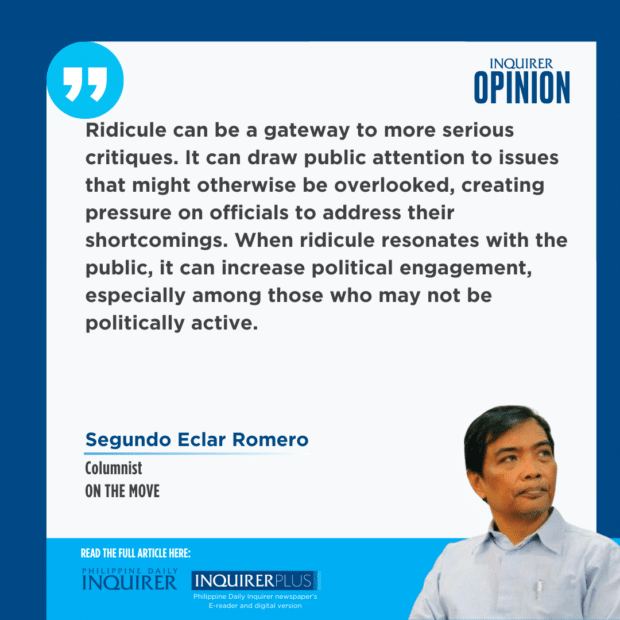Wielding ridicule responsibly

Vice President Sara Duterte has come into a barrage of public ridicule because of her recent arrogant actuation and unresponsive and combative answers to the questions posed to her by the House of Representatives committee on appropriations.
The pushback against the Vice President has taken several forms. The most formal and dignified has been the criticism of her disrespect for a co-equal branch of government, she being a representative of the executive branch facing the House that primarily holds the power of the purse. That power includes determining the budget of government agencies. The House is empowered to obtain testimonies from the entire government bureaucracy on how the various agencies have spent their funds in the past and how they plan to spend their funds in the future.
VP Duterte has also entered a maelstrom of pedestrian ridicule due to her actuation and impudence displayed widely in mainstream and social media. Such optics contrasts starkly with public expectations of decorum in high public officials.
Article continues after this advertisementRidicule, at the pedestrian level, however, invites scrutiny because it focuses on criticism of personal foibles, especially sensitive when culture-based.
In the budget hearing on the Office of the Vice President’s budget, VP Duterte was encouraged by Marikina Rep. Stella Quimbo, senior vice chair of the appropriations committee, to respond to ACT Teachers Rep. France Castro’s questions. VP Duterte answered: “She may not like my answer. She may not like how I answer. She may not like the content of my answer. But I am answering.” Rendered with a Visayan accent, the retort sounded like “shimenet” and memes promptly exploded across social media.
How should Filipinos regard such ridicule in the context of Philippine politics, particularly when it targets cultural or physical traits of public figures?
Article continues after this advertisementSuch ridicule has both detrimental and potentially constructive effects on governance and democracy. Ridicule often shifts the focus from substantial policy issues to superficial aspects, such as personal quirks or physical traits. This can detract from meaningful discourse on governance, allowing politicians to escape scrutiny on more critical matters.
When ridicule becomes the dominant form of critique, it can lead to a sense of resignation among the populace. The focus on mocking rather than holding accountable may result in the normalization of impunity, where the public becomes desensitized to more severe forms of misconduct.
Culturally and physically oriented ridicule can perpetuate a toxic political culture where ad hominem attacks become standard. This environment discourages principled debate and the emergence of leaders who prioritize integrity and competence over populist appeal.
Ridicule has long been a tool in Philippine politics, often used by both the masses and the elite to undermine opponents. Jose Rizal’s satire of the Spaniards and Pugo and Togo’s digs at the Japanese are a legend.
Ridicule can be a gateway to more serious critiques. It can draw public attention to issues that might otherwise be overlooked, creating pressure on officials to address their shortcomings. When ridicule resonates with the public, it can increase political engagement, especially among those who may not be politically active. This heightened interest can be harnessed to push for greater transparency and accountability.
Ridicule can serve as an emotional outlet, allowing people to express dissatisfaction with the political elite. However, if not channeled into constructive action, it risks fostering cynicism and disengagement from the political process.
The elite might either dismiss ridicule as irrelevant or exploit it to their advantage by using it to rally their base. Former president Joseph Estrada skillfully used elite ridicule of his English and intellect to boost his electoral changes.
In the budget hearing episode, the diehard Duterte interpretation is so diametrically dissonant, with one rabid influencer interpreting the Vice President’s “unaccompanied” appearance as a heroic foray into the legislative lion’s den and slaying all her detractors.
Ridicule should be accompanied by serious critiques and proposals for reform. Civil society and media can play a role in steering the conversation toward substantive issues. Platforms that document and analyze the actions of public officials, while also engaging in satirical commentary, can be effective in maintaining pressure on the government.
Public ridicule can be a starting point for broader civic participation. By channeling this energy into organized movements or campaigns, it can help push for reforms in governance and greater transparency. The challenge for political reform advocates lies in transforming the initial spark of ridicule into sustained civic action that demands accountability from the nation’s leaders.
doyromero@gmail.com
















